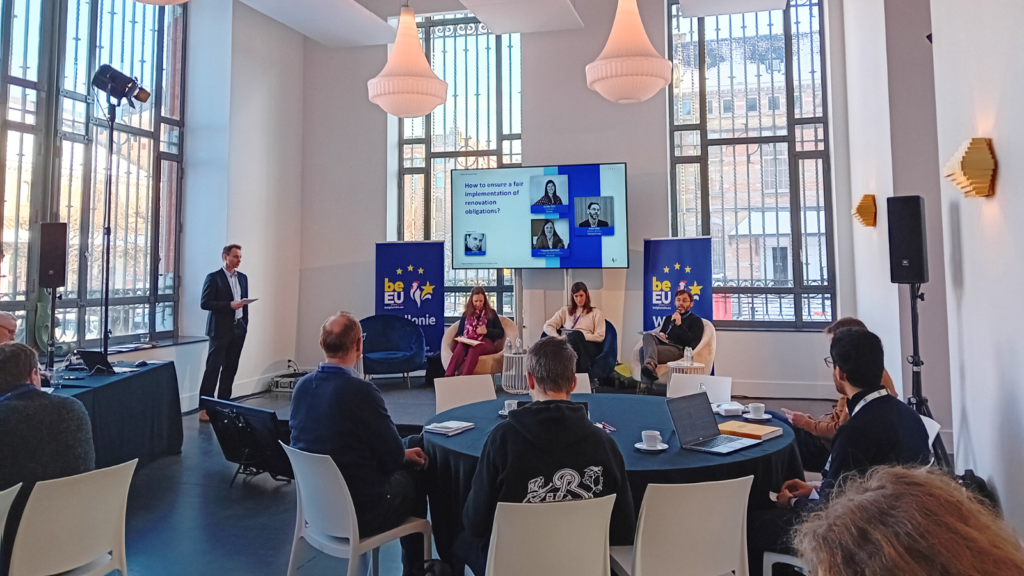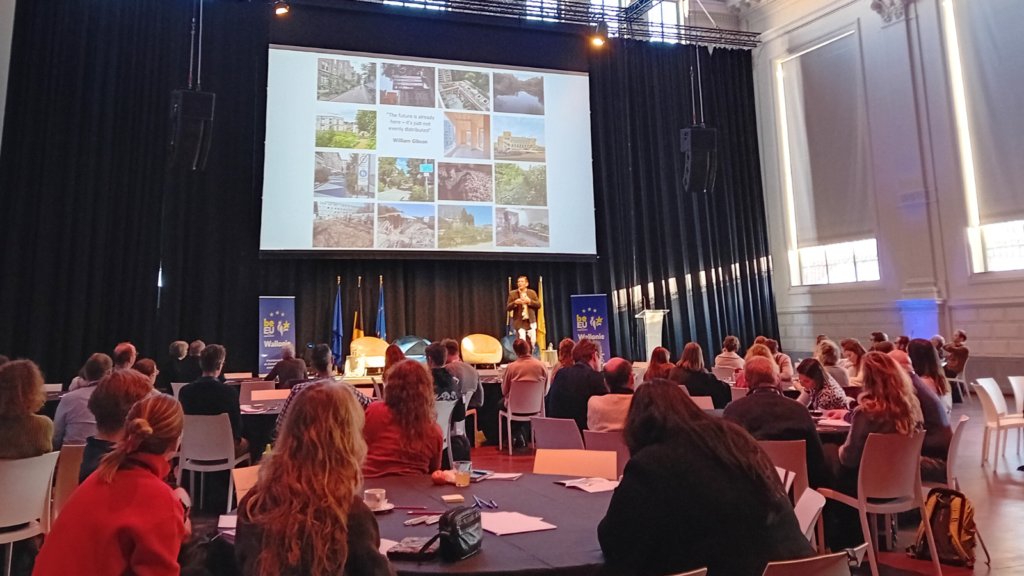When developing renovation projects, we must always centre the daily lives of residents, how we use our homes, and what people need. On 18 January, Eurhonet attended the Belgian Renovation Week, hosted in the context of the Belgian EU Presidency. We aimed to gain insights into integrating technical and social approaches to renovation. These findings will feed into Eurhonet’s work, as a focus of our Topic Group meetings will be on promoting tenants’ involvement in renovation projects.
Under the revision of the Energy Performance of Buildings Directive (EPBD), the primary energy use of buildings in EU Member States must decrease by 16% by 2030 and 20% by 2035, explained Julien Dijol, Housing Europe at last week’s event. The target will require a large-scale renovation of properties. “The public, cooperative and social housing sector is one of the frontrunners for decarbonisation,” stated Dijol. However, numerous challenges remain. Not least, financing, especially as costs are likely to increase further. “To renovate at scale successfully, we need funding, a proper supply chain, and reliable indicators,” said Dijol.
Social approaches to renovation: tenants’ input
Obtaining and incorporating input from tenants in renovation plans is another significant challenge for public and social housing providers. Renovation should improve wellbeing and quality of life. However, Pascal Lanselle, Use Management Assistance Network (AMU), emphasised a lack of end-user input. Aurelie Ciuti, Walloon Network for Sustainable Access to Energy, supported the involvement of social workers and other social actors. “People live busy lives, and their worries may be elsewhere,” Ciuti explained. “That is why we need to meet people where they are, in their homes (…) and bring neutral support from the beginning of any project all the way until checking the renovation works.”
An illustrative example is the transformation of Antwerp’s Left Bank district, aiming to become climate neutral by 2030. Here, the poverty rate is around 48% and housing is generally comprised of both social housing and privately owned condominiums, whose owners are often in vulnerable circumstances. The renovation outreach strategy involves renovation coaches, social work, and behavioural advice, explained Britt Berghs, Antwerpen voor Klimaat. The comprehensive approach helps people to understand the process, the support available, and the complex structure of subsidies.


Changing habits, changing mindset
Panellists agreed that a shift in mindset will mean re-evaluating how we use our buildings, what it means to live a comfortable life, and what level of consumption is acceptable. Françoise Bartiaux, Université Catholique de Louvain (UCL), stressed the importance of a systemic approach, considering housing, mobility, and habits collectively.
“Changing our habits takes time and motivation,” reminded Lanselle. So how do we get people on-board? Stefan Goemaere, social worker from the Papillon Project highlighted the co-production of practical solutions. The Papillon Project helps people experiencing energy poverty to access energy-efficient appliances through circular economy principles.
Communicating effectively about climate-related initiatives was also recognised as critical. One suggestion was to emphasise the health benefits arising from renovation works. Environmentalist Rob Hopkins urged us to take a more ‘fluid’ approach to time: “we need to bring the future into 2024 so people can interact and see how it will be.” Examples included a ‘Civic Imagination Office’ based in Bologna, Italy. The office encouraged listening, collaboration, and co-production of projects in the city. The important thing, Hopkins stressed, is to encourage innovative, imaginative thinking.
We are looking forward to bringing these insights to our upcoming joint meeting between the Eurhonet Sustainable Construction and Social Integration Topic Groups in May. This collaborative initiative will explore ways to better involve tenants in renovation works. It will draw on the expertise of practitioners from various disciplines – including architects, social workers, engineers, community development managers – to examine how we can create climate-conscious neighbourhoods that prioritise residents’ social needs.





